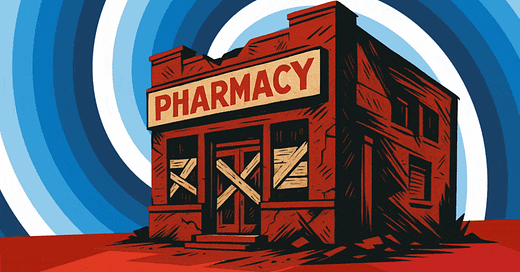Pharmacies In Desperate Need of an Antidote
Chains and independents alike are shuttering as pharmacy benefit managers tighten reimbursements.
The pharmacy industry seems to be in its most perilous position in recent memory. In the last two weeks, major chains Rite Aid and CVS Health said they were closing a combined 570 pharmacies nationwide.
The grocer Kroger announced this month it will close 60 of its stores – and their pharmacies.
The closures come as CVS Health has faced significant fines in states like Ohio for chronic understaffing and an inability to fill prescriptions.
“Those are key evidence points that retail pharmacy is being pressured like never before,” said Antonio Ciaccia, former head of government affairs for the Ohio Pharmacist Association who now consults nationally for drug-pricing reforms.
Why is this happening?
An alarming period for pharmacists began in 2018 when they started to notice troubling tactics by pharmacy benefit managers (PBMs). Led by CVS Health, the PBMs were squeezing pharmacies by reducing reimbursement costs for drugs the pharmacists had paid to have on the shelves for their patients.
After a prolonged period of not being fully reimbursed for the cost of those drugs, pharmacists began to cry foul. The response by PBMs was: “OK. Do you want to sell your pharmacy to us?”
Pharmacists across the country reported they were receiving these calls to sell from CVS, Rite-Aid and Walgreens while getting squeezed on reimbursements by PBMs.
The nation’s three biggest PBMs – CVS, OptumRX and Express Scripts – process nearly 80 percent of the prescriptions in the United States.
The PBMs, which act on behalf of insurers, dictate to pharmacies the cost of the prescriptions on a drug-by-drug basis. What goes into those pricing decisions is a mystery; PBMs claim the information is proprietary.
The PBMs also require pharmacists to sign contracts to get access to insured patients. If the pharmacists don’t sign the contracts, they can’t process those prescriptions.
The FTC has since labeled some of these PBM tactics as anticompetitive.
CVS officials have denied squeezing out independent pharmacies and maintained that the reimbursements at the time were higher than they gave to their own pharmacies.
CVS, however, declined to share any data to support that claim.
But the fallout of these tactics has been brutal for Americans. Nearly 26,000 pharmacies have closed in the United States over the last decade, according to a 2024 nationwide study.
Billionaire businessman Mark Cuban was in Washington, D.C. in late June lobbying lawmakers on such tactics by PBMs. Cuban has started his own online pharmacy that promises transparency and fairness for patients called CostPlus.
Cuban blames PBMs for much of the pressure facing pharmacies.
“When you don’t get reimbursed for your cost on brand drugs, it’s going to be hard to stay in business,” Cuban said. “Rite Aid is closing for the same PBM reasons. CVS – I don’t know.”
CVS Cannibalizing Its Own Pharmacies?
Cuban and Ciaccia both can’t explain why CVS Health is closing so many of its own pharmacies. They both agreed it will take some time to understand why.
One possible reason: the rise of telehealth and the resulting boom in mail-order and online pharmacy services. CVS Health is a major player in that market, which has grown to more than $550 billion.
But another explanation could be more straightforward. CVS Health is dedicating more of its resources toward its PBM because that’s where the money is made.
Eric Pachman, a former pharmacist turned data analytics guru for Bancreek Capital Advisors, recently posted a startling analysis of where healthcare companies are allocating resources.
His chart, using 25 years of data from the federal Bureau of Labor Statistics, shows that beginning in 2010, health care chains began spending significantly more on salaries in the PBM sector.
Pharmacy was left behind.
That sharp increase in the PBM spend by these health care conglomerates came largely from increases in your insurance premiums.
During that same period, Americans saw a 60 percent increase in their employee-sponsored health care costs — just as PBMs really began to dominate the market.
There are likely more pharmacy closures to come, leaving more health care deserts for Americans, Ciaccia said.
Luke Sullivan has been an investigative reporter for 22 years. Part of The Columbus Dispatch Side Effects investigative team that exposed pharmacy benefit managers. Ohio State graduate. Girl Dad.
Previous post you might like:
Big Shifts: CVS Is Pulling the Plug on ACA Coverage — And 1 Million Americans Will Pay the Price
May 15, 2025
CVS says it can’t make enough money covering a million Americans — just as it celebrates nearly $2 billion in quarterly profits and doubles down on high-dollar weight-loss drugs.
By Wendell Potter and Joey Rettino






Times are changing and consumers are being left behind. We need a radical shift in how our government works. CONSUMERS must be the first consideration for passing policies by a government who's role is to provide stability to it's citizens. Currently businesses capitalize on that position. We need to realign our priorities! Single payer universal health care is the only option that makes health care the priority. Mark Cuban... we're listening!
So way back in the 70s and 80s, so many small independent pharmacies were driven out of business by the chains - Rite Aid, Walgreens, et al. My father was an independent who held on as long as he could before shuttering his store, and his passion. He loved being the local pharmacist who actually knew his customers and their families. The more things change, the more they stay the same. Now the chains are being forced to evolve (or close) due to further consolidations and vertical integration within our phenomenally dysfunctional "system." Sadly, I don't have much hope for improvement in the next decade...